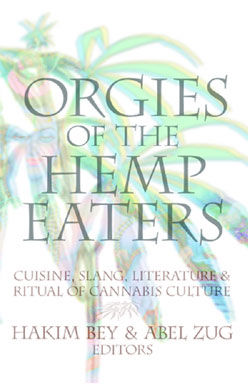DRCNet
Book
Review:
Orgies
of
the
Hemp
Eaters
4/15/2005
Orgies of the Hemp Eaters: Cuisine, Slang, Literature, and Ritual of Cannabis Culture," Hakim Bey and Abel Zug, eds. (2004, Autonomedia, $24.95) Phillip S. Smith, Editor, [email protected], 4/15/05 As someone who writes about drug policy for a living, it is indeed refreshing to sit back and enjoy "Orgies of the Hemp Eaters." There is very little of the standard drug policy reform rhetoric in this compilation of cannabis culture -- no concern about teenage drug use, no worries about the link between pot-smoking and schizophrenia, no maneuvering over how to craft a political message that will appeal to the not-so-pot-friendly masses or political classes, no concessions to the prohibitionists. But while "Orgies of the Hemp Eaters" may have little to offer for drug reform wonks, what it does do -- and very successfully -- is remind us that there is indeed a whole pot-smoking (and eating and drinking) world out there in which drug czar John Walters and the rest of his prohibitionist posse are basically irrelevant.
Bey in particular is especially well-suited for the task. Born Peter Lamborn Wilson, Bey is an experienced traveler in the Middle East and Asia and a longtime cannabis aficionado who is also a deep, if extremely unorthodox, spiritual seeker. Founder of the Moorish Orthodox Church, an obscure sect that uses cannabis as a sacrament and which is historically linked to even more obscure psychedelic sects such as the Neo-American Church and Timothy Leary's International Freedom Front, Bey is a standard bearer for mystic cannabis spirituality. (As author of the 1990 work, "Temporary Autonomous Zones," Bey has also become one of the leading anarchist theorists of the era.) "In the tribal society of the Neolithic," writes Bey in his introductory essay Bhang Nama (treatise on cannabis), "cannabis appears to have been widely used as a sacrament, allowing everyone at least a taste of the shamanic experience. But with the rise of Civilization, all the entheogens are either denatured or condemned... Psychedelic knowledge was never wholly lost, but it was forced underground and remains 'forbidden' to this day." There is a reason for that, Bey writes, and it is one that transcends left and right. "In this [last] century, revolutionary movements have condemned cannabis as vehemently as the reactionary regimes they oppose, because the herb is seen as the enemy of order, productivity, discipline, militancy, good morals, and the unidimensional rationalist model of human cognition. Capitalism and communism could at least agree on their hostility to entheogens." Given the interests and proclivities of Bey and Zug, it is no surprise that "Orgies of the Hemp Eaters" focuses primarily on cannabis in the Middle East and South Asia. But that focus is very broad, with articles, essays, and scientific reports covering everything from prehistoric Indian cannabis gods and the ritual uses of bhang, charas, and kief to hoary legends of the Assassins, the 11th and 12th Century Ismaili Islamic heretics who sowed terror around the civilized world. Supposedly, the word assassin itself derives from hashashin, the name given to the young killers in the employ of Hassan-i Sabbah, the Old Man of the Mountain, whom Sabbah would convince would be rewarded in heaven after supposedly dosing them with hash and leaving them in a veritable garden of earthly delights. Bey isn't buying this story, but it is a fascinating tale, and one that should resonate in these troubled times. Am I the only one who sees eerie parallels between Sabbah and another bearded, murderous global personage and Islamic fanatic glowering down these days from some remote mountain? I wrote above that "Orgies of the Hemp Eaters" pretty much ignores drug policy, but that is not entirely true. As Bey noted, and as Brian Inglis teased out in his essay, "The Forbidden Game," the proper role of cannabis has long been the subject of scholarly debate among Islamic religious thinkers. One of them, whose name has been lost in the mists of time, articulated a policy position on cannabis that rings as true today as it did nine centuries ago: "Hashish intoxication contains a hidden secret too subtle for minds to explain. They have declared it forbidden without any justification on the basis of reason and tradition. Declaring forbidden what is not forbidden is forbidden." Running to more than 700 pages, including 250 pages of bibliographical citations, and including nearly a hundred discrete articles, essays, or reports, "Orgies of the Hemp Eaters" is an invaluable compendium of cannabis lore and scientific investigation. It includes extensive excerpts from the 1893 Indian Hemp Commission findings, as well as numerous other scientific reports from an era where science was not guided by the politicized imperatives of drug control, which now finds researchers trapped in an effort to find something, anything wrong with cannabis -- if they want to be funded. It also includes an extensive selection of cannabis-inspired literature, ranging from Baudelaire and Fitz Hugh Ludlow to Paul Bowles and the Fugs. And there are some mighty fine looking recipes in there, too. "Orgies of the Hemp Eaters" is organized in a fashion that allows readers to jump in wherever they feel like it. That nonlinearity should be part of a book by Bey and Zug comes as no surprise, especially once the reader has gotten a glimpse of their mindsets by reading this volume. Put it on your nightstand. Then, after a hard day of toiling in the trenches of drug reform and butting heads with prohibitionists, relax, read, and ruminate on a world where charas-smoking mystic fakirs are more important than besuited drug czars.
|

